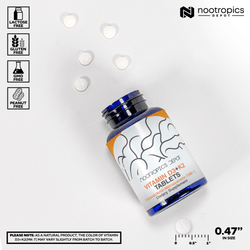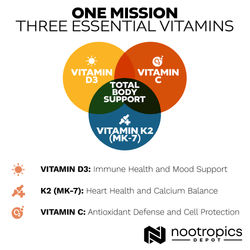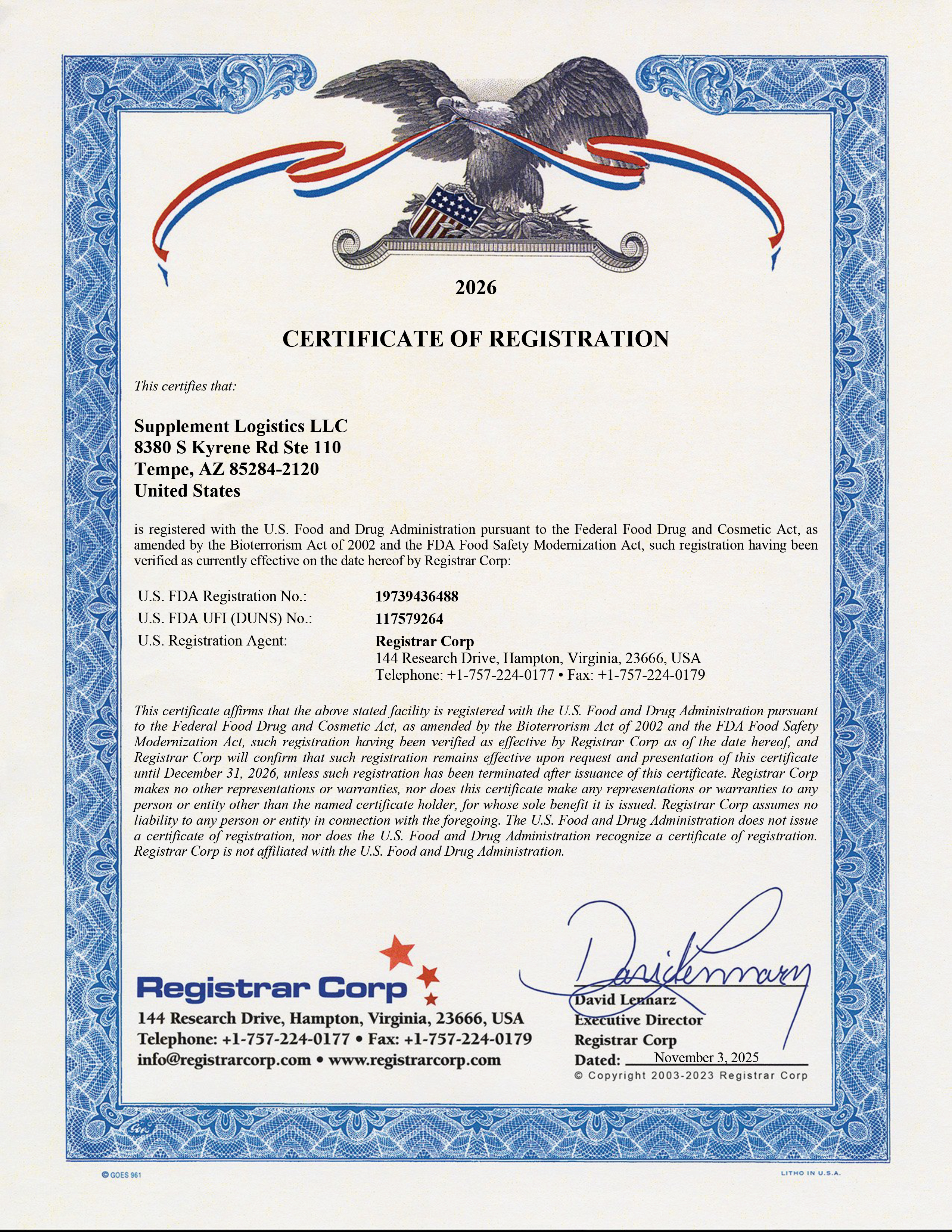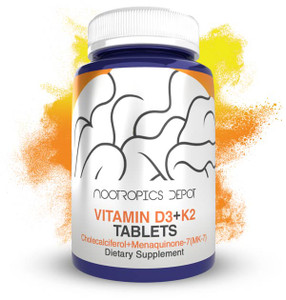





Vitamin D3 + K2 (MK-7) With Vitamin C Tablets
Your order will be shipped tomorrow
Benefits
Time to notice full effects: 1-2 Weeks
-
Immune
-
Joint Health
-
Cardiovascular
-
Oxidation
Summary
Vitamin D3 + K2 (MK-7) with Vitamin C supports immune health by enhancing cellular function. It also promotes bone health by increasing bone density, and may support cardiovascular health by improving arterial flexibility and reducing calcification.
Product Usage
One Tablet
Morning
With Food
1 Time Daily
Build Your Stack
Unlock your full potential by building a supplement stack tailored to your unique goals. Whether you're focused on energy, focus, or overall wellness, we’re here to guide you in creating the perfect combination of supplements to support your journey. Your health, your way—powered by the right stack.
Why Should I Take Vitamin D3 + K2
Vitamin D3 is an incredibly important vitamin that the majority of us do not get enough of, especially during the colder and darker winter months. This is due to the fact that the majority of vitamin D is synthesized by sunlight in our skin. When we do not experience a lot of sunlight exposure on our skin, this then also means that our vitamin D production plummets! This can cause a host of issues, the most notable of which is low mood. However, over the long term, not getting enough vitamin D can result in adverse effects on bone health, immune function, testosterone production, neurological function and muscle health.
When it comes to supplementing with vitamin D, there are a few routes that can be taken. One of those is to supplement with vitamin D2, however, this method presents with some drawbacks such as lower absorption and conversion to a potentially less potent form of active vitamin D. The other option is vitamin D3, this form appears to absorb better than vitamin D2, and readily converts to the main active form of vitamin D which is 1,25-(OH)2 vitamin D3 (calcitriol). With all this in mind, our vitamin D product contains vitamin D3. Additionally, the vitamin D3 we use has been microencapsulated. This leads to slightly better absorption and makes it more effective when taken without food. We also add in a solid dose of vitamin K2 (as MK-7), to further help enhance the beneficial effects of vitamin D3 as there is a lot of synergy between vitamin D and vitamin K2! In order to keep everything nice and stable, we even added in a dose of vitamin C in order to prevent oxidation of the vitamin D3 and K2.
What is Vitamin D3?
Vitamin D3 is an essential vitamin that plays a role in a number of important bodily functions, most notably bone health and immune function. Synthesis of Vitamin D3 occurs in the skin through UVB radiation. Vitamin D3 also occurs in dietary sources such as fish and milk that has been enriched with Vitamin D (often the inferior vitamin D2 though). However between sun exposure and our diet, this is oftentimes not enough, and Vitamin D deficiencies are quite common. In fact, research has shown that the previously recommended daily intake of Vitamin D foods is insufficient for most people. This led to the rise of people taking a Vitamin D supplement for Vitamin D benefits over the years. Many people are already familiar with the various health benefits of Vitamin D which include bone health, mood, immune and cognitive function enhancement, with additional benefits to metabolic and cardiovascular function.
How Many Vitamin D IU's?
Most Vitamin D supplements list the dosage in international units (IU), so you may have wondered, what is the vitamin D IU dosage in our Vitamin D3 + K2? The simple answer to this is 5000 IU, but let’s talk about IU’s some more! You may have noticed that we do not list a Vitamin D IU dosage, and this is because the IU system is outdated and the industry is currently moving away from it. In fact, current FDA guidance is moving away from IU dosages for vitamins like D, A and E, and are instead advising for listing dosages in micrograms or milligrams. Measuring vitamin D dosages in micrograms instead of vitamin D IU allows for more transparency and accuracy in vitamin D dosing.
So what exactly is an ‘IU’ and why is the supplement industry moving away from it? International Units were designed to be used to quantify biological effects based on a weight dependent dosage. The need for International Units exists because vitamins like D, A and E can exist in different forms that have varying levels of biological effects. IU accounts for these different levels of biological effects between the various forms of the vitamin, such that a certain weight-based dosage of specific forms of the vitamin can be dosed at different levels to produce the desired biological effects. For example, let’s take a look at Vitamin A, 1 IU of Vitamin A is the equivalent of:
-
0.3 mcg retinol
-
0.6 mcg beta-carotene
In this case, IU allows us to dose Vitamin A in different forms while ensuring the desired biological effects. That being said, the actual IU number is arbitrarily set and this is where things start to get a little confusing. For example, 1 IU of vitamin A is not the same as 1 IU of vitamin D. Worse yet, for Vitamin D there is no distinction between the two main forms, D2 and D3, which is why we went with a Vitamin A example above, instead of a specific example for vitamin D. This means that there is no reason to use vitamin D IU doses. Instead, using micrograms coupled with daily value percentages makes a lot more sense for vitamin D. For the other vitamins, like A and E, other systems have been devised that differentiate between the different forms but instead lists microgram doses specified for each different form.
What is Vitamin K?
Vitamin K is an essential vitamin and is typically supplemented for its cardiovascular benefits. The two primary forms of Vitamin K are phylloquinones (Vitamin K1) and menaquinones (Vitamin K2). Vitamin K comes in a few different forms that are sometimes referred to as vitamers, and there are several different vitamers within Vitamin K2 that are abbreviated as MK-x. Vitamin K2 MK-7 is one of the more common types of Vitamin K and is the variant most popularly supplemented for Vitamin K benefits. But what is Vitamin K good for? Although Vitamin K benefits to cardiovascular, metabolic, and bone function have been studied for years, Vitamin K wields a fascinating range of Vitamin K benefits that continue to be researched today.
Recent studies have revealed that a Vitamin K2 supplement may help promote cognitive processes as well. Research conducted over the last decade has shown that cognitive function and Vitamin K supplement consumption appear to be directly correlated. One of the unexpected findings from this research was the relationship between Vitamin K and the myelin sheaths of neurons. Animal studies found that a Vitamin K supplement may help promote myelin sheath function and thus support a critical foundation needed for overall cognitive function. Subsequent studies observed a positive correlation between cognitive-based performance tasks and Vitamin K supplementation.
Vitamin K2 Source: Made from Fermented Soy Natto.
What is Vitamin C?
Vitamin C is also known as ascorbic acid and is an essential vitamin that is commonly found in fruits and vegetables. Even though many foods contain Vitamin C, Vitamin C supplements are some of the most commonly used supplements today. We used Vitamin C in this formulation to improve the stability of Vitamin D3 + K2. Vitamin D3 and K2 by themselves are prone to oxidation, adding Vitamin C shields them from this kind of degradation.
Vitamin D3 + K2 Benefits and Uses
- Support immune function*
- Promotes bone health*
- Promotes mood*
Why Should I Take Vitamin D3 & K2 Together?
It’s well known that most Vitamin D3 and Vitamin K2 supplements are typically formulated together, but why specifically formulate Vitamin K and Vitamin D together? Vitamin K and Vitamin D have a very synergistic relationship with each other and they each help potentiate the other’s benefits! Some of the most notable benefits of these two in combination are their support of cardiovascular and bone function.* Research has also shown that these two exhibit cognitive benefits on their own but can be better utilized when supplemented in combination!
Microencapsulated Vitamin D3 & K2
In an effort to further increase the efficacy of our vitamin D3 and K2 supplement, we have also chosen high end microencapsulated versions of these vitamins. This microencapsulation process allows us to further dial in the absorption of both vitamin D3 and K2! This especially comes in handy for those of us who fast during the day, but would rather take their D3 and K2 product earlier in the day.
The reason for taking vitamin D3 and K2 with a fat containing meal, is that they absorb better due to dietary fats that react with bile acids to create micelles which microencapsulate the vitamin D3 and K2, helping it to absorb. Instead of relying on dietary fat for this process, we can also create the microencapsulation effect outside of the body, which may obfuscate the need for dietary fat consumption alongside our vitamin D3 and K2 product! This makes it ideal for individuals participating in intermittent fasting! That being said, these microencapsulated forms of vitamin D3 and K2 will also help absorption even further when taken with a fat containing meal.
Vitamin D3 + Vitamin K2 Stacks
Check out our recommended Vitamin D3 + Vitamin K2 stacks that help further amplify Vitamin D3 + Vitamin K2 benefits!
Cognitive Function Stack: Vitamin D3 + Vitamin K2 with Magtein
This combination is a unique and well-rounded stack for supporting overall cognitive faculties with additional support to cellular function!*
Immune Function Stack: Vitamin D3 + Vitamin K2 with Immune Defense
Add Vitamin D3 + Vitamin K2 to our comprehensive Immune Defense formula for added support to immune system function!*
Cardiovascular Support Stack: Vitamin D3 + Vitamin K2 with Hesperidin
Vitamin D3 + Vitamin K2 paired with Hesperidin is a two-pronged approach to supporting overall cardiovascular function with additional benefits to metabolic function. *
Vitamin K2 and Vitamin D3 Dosage
As a dietary supplement, take one Vitamin D3 + K2 tablet daily.
Vitamin D3 and Vitamin K2 Reviews
To gain more insight, see the Vitamin D3 + Vitamin K2 reviews and experiences below.
Where to Buy Vitamin D3 + Vitamin K2 Tablets
Nootropics Depot offers 60ct. and 365ct. jars of high quality Vitamin D3 + Vitamin K2 tablets. Nootropics Depot’s Vitamin D3 + Vitamin K2 tablets have been lab tested and verified for both product purity and identity.
| *Attention: This product is not intended to diagnose, treat, cure, or prevent any disease. It has not been approved, nor have these statements been evaluated by the FDA. |
Lab Testing Results / Certificate of Analysis (COA)
Trust Through Transparency
Your health matters, which is why we only use the best 3rd party ISO accredited labs and cGMP certified and FDA registered facilities right here in the USA
Learn more
















